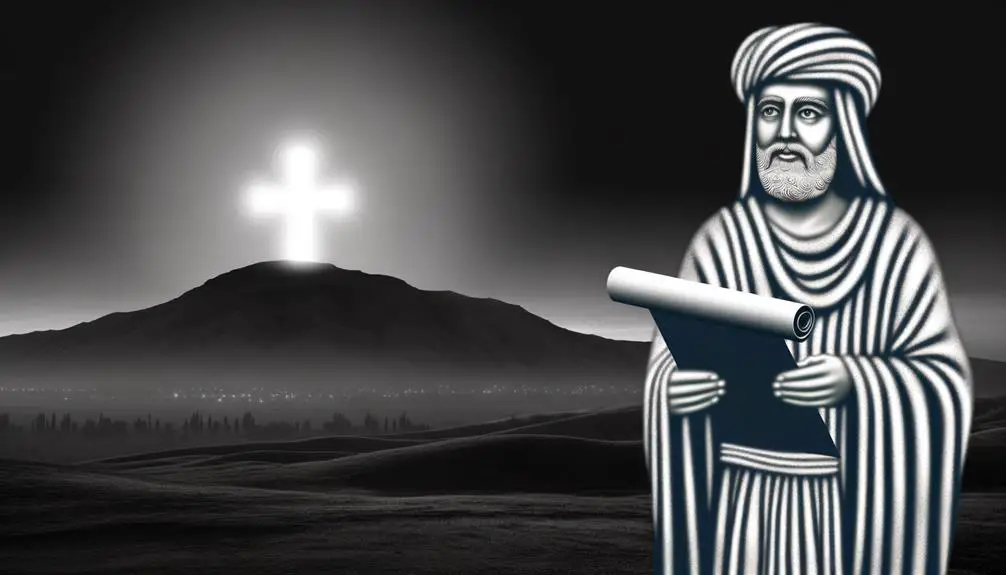Yearning to understand divine wisdom? Discover how Elias embodies zeal, prophecy, and the sacred in biblical narratives.

Elias in the Bible Means
In the Bible, the name Elias, linked closely with the prophet Elijah, holds significant weight. It's derived during a critical era marked by religious and political crises around the 9th century BCE. You'll find that Elias embodies divine wisdom and serves as a bridge between the human and the divine, symbolizing deep piety and zeal. His role isn't only about showcasing miraculous acts but also reinforcing the covenantal obligations between God and His people. Each narrative about Elias underscores his importance in maintaining spiritual fidelity amid pervasive idolatry. Uncovering the layers of Elias's character reveals the depth of his prophetic and spiritual significance.
Key Takeaways
- Elias is a biblical figure synonymous with the prophet Elijah, representing divine wisdom and messages.
- His name signifies a strong connection to God and prophetic identity.
- Elias symbolizes the struggle between true worship of Yahweh and idolatry.
- He embodies spiritual leadership, demonstrating faith through miracles and teachings.
- Elias is crucial in linking Old Testament traditions to Christian theology, emphasizing the expectation of divine intervention.
The Origins of Elias

Elias, often identified with the prophet Elijah, emerges as a pivotal figure in biblical narratives, tracing his roots to the complex theological landscapes of ancient Israel. You'll find his story deeply embedded within the historical context of the 9th century BCE, a period marked by profound religious and political upheaval. This era saw the division of the united monarchy of Israel and Judah, setting the stage for Elias's significant role in the cultural and religious fabric of the time.
Elias's presence in the scriptures isn't just a mere anecdote; it carries a heavy cultural significance. He's often seen as a symbol of piety and zeal, embodying the struggle between the worship of Yahweh and the Baal cult prevalent in the region. His narrative serves as a critical link between God and the people, often reminding them of their covenantal obligations in times of moral and spiritual decay.
This backdrop isn't just historical; it's foundational, shaping the perceptions and religious attitudes of generations. By understanding Elias within this framework, you're not just looking at a historical figure, but a pivotal character whose life and missions have been instrumental in shaping theological thought and practice in the Judeo-Christian tradition.
Elias's Miraculous Acts
Throughout his ministry, numerous miraculous acts were attributed to him, marking him as a central prophetic figure who challenged the prevailing idolatry with divine power. You'll find that these acts weren't just displays of power but were deeply symbolic, each carefully crafted to reinforce his messages about faith and God's omnipotence.
One of the most significant divine interventions attributed to Elias was the miraculous healing of the widow's son. This event wasn't merely about restoring life; it was a profound demonstration of God's control over life and death, intended to solidify the faith of the Israelites amidst widespread apostasy. The act served as a tangible reminder that God's power transcends all earthly limitations.
Moreover, Elias's ability to bring down fire from heaven during the contest at Mount Carmel is another pivotal example. This wasn't just a spectacular display of divine might; it was a decisive, public refutation of Baal worshipers' claims, affirming the supremacy of the Israelite God. Here, the fire from heaven was a clear, undeniable sign of divine endorsement of Elias's mission, designed to turn the hearts of the people back to their faith.
These episodes highlight how Elias's miracles were not random but purposeful, serving as divine tools to reaffirm God's presence and power in a time of spiritual crisis.
Prophetic Role and Challenges

How did Elias navigate the profound challenges inherent to his prophetic role amidst a society steeped in idolatry? As a prophet, Elias was tasked with delivering divine warnings to a people largely resistant to abandoning their entrenched idolatrous practices. This societal rejection was not merely a backdrop but a palpable force that shaped his mission.
Elias's challenges were multifaceted, ranging from personal threats to his life to the broader societal implications of his prophecies. His approach was both unyielding and strategic, leveraging his deep connection with the divine to guide his actions and deliver his messages with clarity and conviction.
The following table provides an overview of key aspects of Elias's prophetic challenges:
Aspect |
Description |
Impact on Elias |
|---|---|---|
Divine Warnings |
Delivering messages of repentance and divine judgment |
Heightened conflict with authority |
Societal Rejection |
Facing disbelief and hostility from the populace |
Isolation and increased danger |
Idolatry Prevalence |
Combatting widespread idol worship |
Continuous engagement in spiritual warfare |
Personal Threats |
Experiencing direct threats to his life |
Reliance on divine protection and resilience |
Through these trials, Elias exemplified the epitome of prophetic courage, underscoring the resilience required to uphold divine mandates against formidable societal opposition.
Symbolism of Elias's Name
As you explore the symbolism inherent in the name Elias, you'll find that it underscores a profound divine connection. This name not only reflects his prophetic identity but also encapsulates the broader religious and cultural significance attributed to his role in biblical narratives. By examining this linkage, you gain deeper insight into how names function as pivotal elements in scriptural texts, shaping perceptions and theological interpretations.
Elias: Divine Connection
Elias's name, embodying the Hebrew root for 'Yahweh is God,' serves as a profound symbol of his divine connection and mission. This linguistic foundation isn't just a label; it's a declaration of his inherent role in spiritual enlightenment and sacred communications. As you explore further into the etymology and scriptural contexts, you'll find that his name isn't merely a personal identifier but a summary of his divine mandate.
Aspect |
Significance |
|---|---|
Spiritual Role |
Conduit of divine wisdom |
Sacred Duty |
Facilitator of sacred messages |
Divine Link |
Embodiment of God's omnipresence |
Through this name, Elias is intertwined with a celestial narrative, uniquely positioned to bridge the human and the divine, marking him as a pivotal figure in biblical theology.
Prophetic Identity Exploration
Delving into the symbolism of Elias's name reveals layers of prophetic significance that underscore his pivotal role in biblical narratives. In your exploration of his prophetic identity, you'll find that 'Elias' is derived from the Hebrew name 'Elijah,' meaning 'Yahweh is my God.' This etymology isn't just a label; it's a declaration of divine allegiance and a key to understanding his confrontations with Baal worship in the narratives.
This identity exploration isn't merely about a name, but about a figure deeply embedded in spiritual leadership and God's direct intervention. It highlights how Elias's actions and his very identity are entwined with the unfolding of God's plans, marking him as a significant conduit for divine messages throughout the scriptures.
Elias in Christian Theology

In Christian theology, Elias is often equated with Elijah, emphasizing his role as a prophet and harbinger of spiritual truths. Delving into Elias's teachings within the historical context reveals a multifaceted figure pivotal to understanding early Christian thought patterns and doctrinal evolutions.
Elias's influence in Christian theology can be dissected into several key areas:
- Prophetic Authority: Elias, as a prophet, holds a revered status. His prophetic voice, considered to be inspired by the divine, was pivotal in shaping the early Christian views on prophecy and divine revelation.
- Eschatological Significance: His teachings often carried apocalyptic tones, which emphasized the imminent expectation of God's intervention in history.
- Moral Exhortation: Elias's calls for repentance and adherence to God's commandments were significant in forming the moral foundations of Christian communities.
- Theological Contributions: His interpretations of Jewish law and prophecy helped bridge the theological gap between Old Testament traditions and emerging Christian doctrines.
Understanding Elias in this layered context allows you to appreciate how deeply interwoven his figure is within the tapestry of Christian theology, serving not just as a historical figure but as a perpetual symbol of faith and divine pursuit.
Comparisons With Prophet Elijah
Understanding the parallels and distinctions between Elias and the Prophet Elijah offers insights into their respective roles and significances within biblical narratives. In your exploration of these figures, you'll encounter a rich tapestry of prophet parallels and Elijah comparisons that deepen your understanding of their influence in scripture.
Here's a detailed table highlighting key aspects and differences:
Aspect |
Elias |
Prophet Elijah |
|---|---|---|
Historical Context |
Often considered a New Covenant figure |
Central Old Covenant prophet |
Symbolic Role |
Forerunner of Christ's second coming |
Harbinger of messianic times |
Miraculous Deeds |
Few specific miracles are attributed |
Numerous, including raising the dead |
Interaction with Other Prophets |
Limited direct interactions |
Direct mentor to Elisha, among others |
Representation in Scripture |
Symbolically linked to John the Baptist |
Detailed narrative in Kings |
Analyzing these elements, you can see how Elias, though less directly documented in miraculous deeds, serves a pivotal role symbolically, particularly in eschatological contexts. Elijah, with his vivid narrative and direct actions, illustrates the power and direct intervention expected of Old Covenant prophets. This comparative analysis not only enriches your grasp of their stories but also clarifies their distinctive contributions to the biblical canon.
Elias's Impact on Faith

Elias's influence on faith can be seen as both profound and multifaceted, shaping theological perspectives and eschatological expectations within Christian doctrine. His leadership played a pivotal role in steering through faith controversies, which often challenged the core beliefs of the community.
Elias's role was critical in four key areas:
- Clarification of Doctrine: He addressed ambiguities in religious teachings, reinforcing doctrinal purity and helping believers understand complex theological concepts.
- Mediation in Disputes: Elias often acted as a conciliator in theological debates, ensuring that discussions did not fracture the community but rather led to stronger, more unified faith practices.
- Prophecy and Eschatology: His insights into prophetic texts provided followers with a framework for understanding future events, deeply influencing eschatological studies.
- Spiritual Leadership: Through his example and teachings, Elias molded the spiritual lives of his followers, fostering a deeper, more committed approach to faith.
His adept handling of these areas not only cemented his status as a key religious figure but also guaranteed that his impact would echo through the ages, continually shaping how individuals and communities conceptualize and practice their faith.
Lessons From Elias's Life
In examining Elias's life, you'll find his faithful devotion not only a central theme but also a catalyst for his profound impact on prophetic missions. His experiences encapsulate a range of challenges and triumphs, offering a rich tableau for understanding the dynamics of spiritual leadership. Analyzing these aspects reveals how his life serves as a blueprint for resilience and unwavering commitment in the face of adversity.
Elias's Faithful Devotion
Reflecting on Elias's life, you'll observe that his steadfast devotion dramatically underscored his prophetic missions. His devotional practices were not just rituals but a profound demonstration of spiritual resilience. This resilience was vital, allowing him to withstand severe trials and persist in his divine mission despite formidable challenges.
Here are key aspects of Elias's devotion:
- Prayer: Continuous, fervent communication with God.
- Fasting: Often withdrawing from physical sustenance to seek spiritual strength.
- Obedience: Unwavering adherence to divine commands, even when perilous.
- Proclamation: Boldly declaring God's truth, regardless of the personal cost.
These elements didn't just define his spiritual life; they fortified him, equipping him to enact God's will with unshakeable faith.
Prophetic Missions Impact
Examining the profound impact of Elias's prophetic missions reveals lessons that resonate across centuries, offering insights into the dynamic interaction between divine guidance and human action. As you explore this historical figure's life, you'll find that the historical accuracy of Elias's accounts underscores their significance, ensuring that his actions and their outcomes are not just inspirational but also credible. This solid foundation allows you to appreciate the contemporary relevance of his lessons today. His life exemplifies how steadfastness in faith and purpose, guided by divine will, can effect significant societal transformation. Understanding Elias's approach helps you grasp the subtleties of fulfilling divine mandates within human contexts, enhancing your comprehension of spiritual and ethical leadership.
Challenges and Triumphs
Throughout Elias's life, you'll observe how his numerous challenges were intricately linked to his remarkable triumphs, offering profound lessons on resilience and divine faith. His persistence in the face of adversity showcases not only Elias's resilience but also his exceptional leadership qualities. Here are four pivotal aspects of his character:
- Steadfast Faith: Despite severe trials, his unwavering belief in divine guidance stood firm.
- Courageous Leadership: Elias consistently led by example, inspiring those around him through action.
- Perseverance in Trials: His ability to endure hardships without faltering highlights his robust spiritual and emotional strength.
- Prophetic Insight: His foresight in handling challenges was instrumental in achieving his missions.
These elements combined to forge a leader whose life offers enduring lessons in overcoming adversity through faith and leadership.
Elias in Modern Interpretations
How has the figure of Elias been reinterpreted in contemporary theological discussions and cultural representations? In modern times, Elias's representation has shifted notably, reflecting contemporary relevance and the evolving nature of theological interpretation. Scholars often debate the prophetic role of Elias, seeing him not just as a historical figure but as a symbol of hope and spiritual renewal. This reinterpretation has led to broader discussions on the applicability of his life and teachings in addressing modern spiritual crises.
In cultural representations, Elias is frequently depicted as a bridge between the divine and the mundane. This imagery resonates in today's world where the quest for spiritual significance often intersects with everyday life challenges. The adaptations of his story in literature and media emphasize his role as a harbinger of change, which speaks to a universal audience about transformation and resilience.
Furthermore, Elias's enduring appeal in contemporary discussions highlights his role in prophetic tradition, particularly in how he embodies the struggle between faith and societal expectations. This dual representation serves as a critical tool for theologians and cultural critics alike, providing a rich vein of narrative and symbolic depth to explore in the context of modern faith discussions.
Reflections on Elias's Legacy

Why should one consider Elias's legacy as pivotal in understanding both historical and modern spiritual dynamics? The answer lies in dissecting the different layers of his influential presence throughout sacred texts and subsequent religious teachings. You'll find that his spiritual journey not only shaped his immediate environment but also set precedents for future spiritual leadership.
Elias's leadership was marked by courage and unwavering faith, qualities that resonate deeply in today's complex spiritual landscape. Here are several facets of his legacy that are particularly instructive:
- Prophetic Role: Elias served as a bridge between the divine and his people, conveying messages that were essential for their spiritual development.
- Miraculous Acts: His life was punctuated with miracles, which served to reaffirm the faith of his followers and underscore the power of spiritual belief.
- Mentorship: He mentored Elisha, ensuring that his teachings and spiritual insight would perdure beyond his own life.
- Symbolic Presence: In modern interpretations, Elias epitomizes the hope of spiritual renewal and the perpetual struggle against spiritual complacency.
Understanding these elements helps you appreciate how Elias's spiritual journey and leadership continue to inspire and challenge individuals in their own faith journeys today.
Frequently Asked Questions
How Do You Pronounce "Elias" in Different Languages?
You'll find 'Elias' pronounced differently across languages due to its etymology and variations. In Spanish, it's "eh-LEE-ahs"; in German, "EH-lee-as." Each variation reflects unique phonetic and cultural adaptations of the name.
Are There Any Popular Songs About Elias?
You'll find few musical tributes directly celebrating Elias, yet his symbolism in songs often coincides with themes of guidance and redemption. These tracks subtly honor his influence through their lyrical depth and resonance.
Which Contemporary Books Feature Elias as a Character?
In contemporary literature, Elias often undergoes significant character development, impacting the narrative profoundly. His role can symbolize resilience and change, influencing other characters and advancing the plot in nuanced, meaningful ways.
What Are Unique Baby Names Inspired by Elias?
You're exploring a garden of names, each echoing the historical significance of Elias. Consider cultural variations like Elio, Ilyas, or Elian, blending tradition and uniqueness in your choice, reflecting deep, scholarly analysis of their origins.
How Has Elias Influenced Modern Naming Trends?
Elias's popularity has surged due to its cultural significance, influencing modern naming trends by providing a unique yet traditional option. You'll notice its impact in diverse communities, reflecting a broad appeal.



Sign up